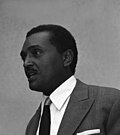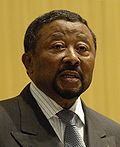 |
|---|
The Minister for Foreign Affairs of Gabon is a government minister in charge of the Ministry for Foreign Affairs of Gabon, responsible for conducting foreign relations of the country.
The following is a list of foreign ministers of Gabon since its founding in 1960: [1]
| No. | Name (Birth–Death) | Portrait | Tenure |
|---|---|---|---|
| 1 | André Gustave Anguilé (1920–1999) |  | 1960–1961 |
| 2 | Jean-Hilaire Aubame (1912–1989) |  | 1961–1963 |
| 3 | Jean François Ondo (1916–1972) |  | 1963 |
| 4 | Joseph Ngoua (1923–1999) |  | 1963–1964 |
| 5 | Jean-Marc Ekoh (1929–2022) |  | 1964 |
| 6 | Léon M'ba (1902–1967) |  | 1964 |
| 7 | Pierre Auguste Avaro (1911–?) |  | 1964–1965 |
| 8 | Jean Engone (b. 1932) |  | 1965–1967 |
| 9 | Jean Marie M'ba |  | 1967 |
| 10 | Benjamin Ngoubou (1925–2008) |  | 1967–1968 |
| 11 | Paul Malékou (b. 1938) |  | 1968 |
| 12 | Jean Rémy Ayouné (1914–1992) |  | 1968–1971 |
| 13 | Georges Rawiri (1932–2006) |  | 1971–1974 |
| 14 | Paul Okoumba d'Okwatsegue (1933–2020) |  | 1974–1976 |
| 15 | Martin Bongo (b. 1940) [a] |  | 1976–1989 |
| 16 | Ali Bongo (b. 1959) [b] |  | 1989–1991 |
| 19 | Pascaline Bongo Ondimba (b. 1956) [c] |  | 1991–1994 |
| 20 | Jean Ping (b. 1942) |  | 1994 |
| 21 | Casimir Oyé-Mba (1942–2021) |  | 1994–1999 |
| (20) | Jean Ping (b. 1942) |  | 1999–2008 |
| 22 | Laure Olga Gondjout (b. 1953) |  | 2008 |
| 23 | Paul Toungui (b. 1950) [d] |  | 2008–2012 |
| 24 | Emmanuel Issoze-Ngondet (1961–2020) |  | 2012–2016 |
| 25 | Pacôme Moubelet-Boubeya (b. 1963) |  | 2016–2017 |
| 26 | Noël Nelson Messone (b. 1960) |  | 2017–2018 |
| 27 | Régis Immongault Tatangani |  | 2018–2019 |
| 28 | Abdu Razzaq Guy Kambogo (b. 1974) |  | 2019 |
| 29 | Alain Claude Bilie By Nze (b. 1967) |  | 2019–2020 |
| (25) | Pacôme Moubelet-Boubeya (b. 1963) |  | 2020–2022 |
| 30 | Michael Moussa Adamo (1961–2023) |  | 2022–2023 |
| — | Hermann Immongault (b. 1972) Acting Minister |  | 2023 |
| Yolande Nyonda (b. 1965) Acting Minister |  | ||
| 31 | Hermann Immongault (b. 1972) |  | 2023 |
| 32 | Régis Onanga Ndiaye (b. 1966) |  | 2023–present |
